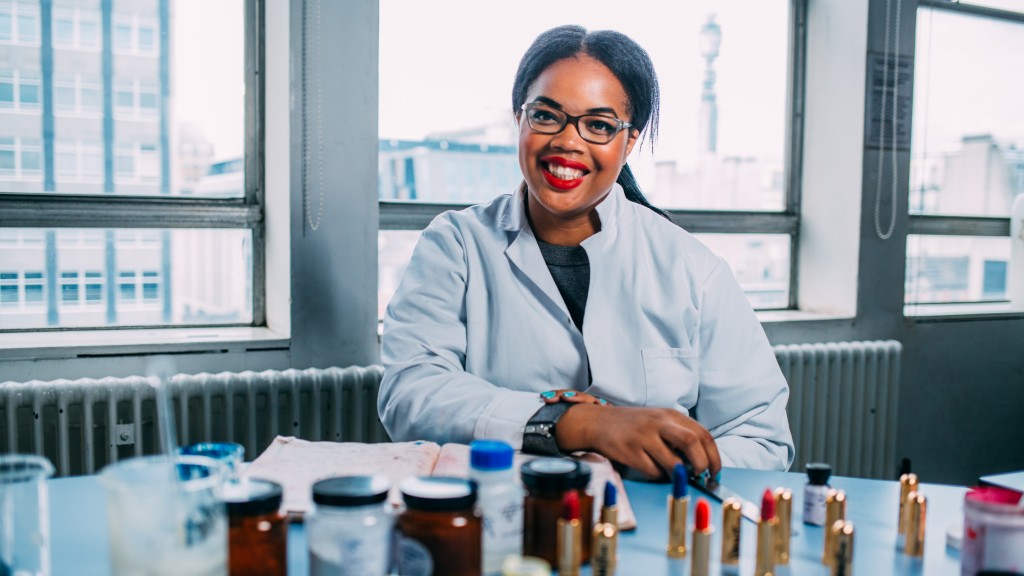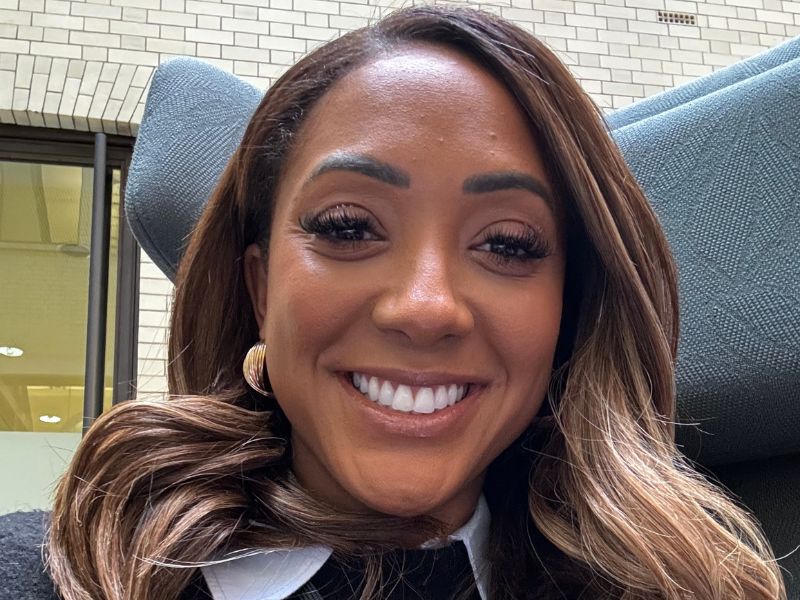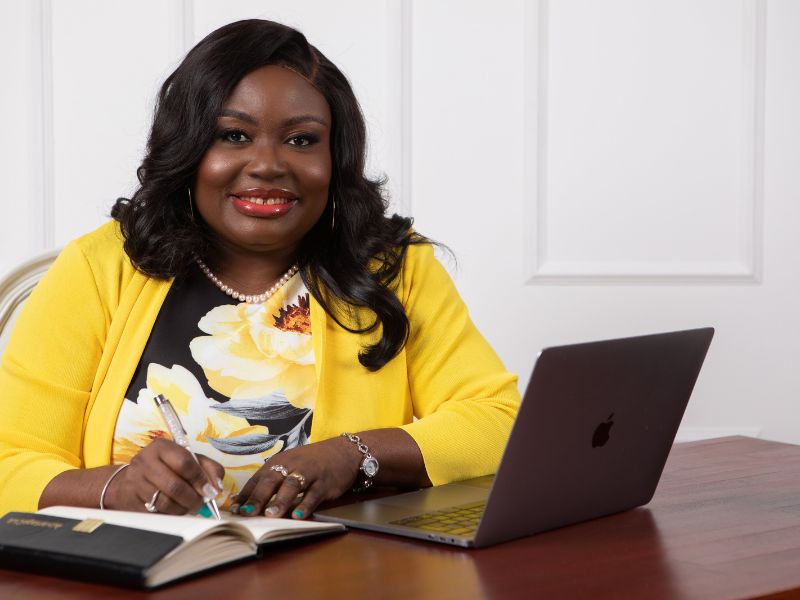Florence Adepoju was curious about science and now she’s a cosmetic scientist and founder of her very own makeup brand MDMflow.
She’s 24 years old and has a BSc Hons in Cosmetic Science from the London College of Fashion, where she graduated in 2013. It was here that she began to create her brand of colourful, vibrant lipsticks inspired by 90s hip hop culture. At school, she loved science and technology – as well as art and design – and thought she would have to choose between the two when she started her career – she never imagined she’d be able to combine both of her passions.
Florence is a role model for the EDF Energy #PrettyCurious programme which is designed to inspire teenage girls by in troducing them to women they can identify with.
troducing them to women they can identify with.
How did you find studying science at school?
I loved studying science at school, and along with art it was my favourite subject. I think I was drawn to it because I enjoyed learning about how and why things work.
At what age did you first become interested in science and what was it that excited you?
I’ve been interested in science for as long as I can remember, but I think it was around the time that I started secondary school that I took a keen interest in chemistry specifically.
What was your peers’ attitude towards Science, Technology, ICT and Maths when you were growing up?
Although I’ve always been interested in science, growing up a lot of my classmates considered STEM subjects to be geeky or boring. This attitude was particularly prevalent amongst girls, for example I took special classes after school to get my GNVQ qualification in ICT and the class was predominantly made up of boys. I found it to be one of the most interesting subjects I studied, however, I thought it was a shame that many of the girls I went to didn’t take it up – they just couldn’t see how it might be useful in the future.
What made you decide to take science subjects for A Level?
I opted to take triple science for GCSE and then because I particularly Chemistry, I decided to continue to study it at A Level too. At the time I thought I wanted to become a doctor or a pharmacist and so I chose to do Biology as well because if you want to study a traditional science degree you need at least two science A Levels.
Who were your role models when you were growing up (particularly any science-related)?
Quite a few of my older female cousins are doctors and pharmacists and so I’m lucky to have grown up with some great female role models in science-related careers. It was great to have this as it meant I always knew a career in science was possible and not something exclusively reserved for men. Furthermore, one of my favourite books when I was younger was called Nothing Lasts Forever by Sidney Sheldon. The novel tells the story of three female doctors, all of whom are depicted as powerful and very talented women. I have vivid memories of wanting to be just like the characters in the book and so was certainly spurred on by my love of the book!
Did these role models differ from other girls’ your age?
My family background and taste in books meant that unlike other girls my age I was lucky to be exposed to female role models within the STEM industry. As my interests extended beyond science, however, I did also have many role models from other industries like music and fashion.
What made you want to do a science related degree at university?
My longstanding interest in chemistry meant that I always knew that I wanted to study a degree that was in some way related to science. Discovering that I could do a degree in Cosmetic Science degree was a revelation though, as it allowed me to combine my love of science with the creative side of beauty.
Your degree wasn’t a traditional science degree, how did you discover it existed?
When I first discovered that you could study Cosmetic Science as a degree I didn’t really understand what it would entail. I ended up finding a YouTube video of a group of students on the degree formulating a foundation and instantly became very excited that I had found a way to combine my love of science and beauty. It’s always a good idea to dig a bit deeper beyond the traditional subjects offered, as like me you might discover something perfect for you that you didn’t even know existed.
When you chose your degree did you have a specific career goal in mind?
When I chose to study a degree in Cosmetic Science I was working on a makeup counter and so dreamed of creating my own brand makeup brand. However, it was only after I started the course that I realised it could be more than just a pipe dream and began to think of ways to make it a reality.
Did you ever feel the pressure to study more traditionally ‘girly’ subjects?
I’ve never really felt pressure to study more traditionally ‘girly’ subjects, however, I did think I would have to choose whether I embarked on a science career or a creative career. I had no idea that some science careers still allowed for a great deal of creativity.
Were you ever intimidated by the idea that science is traditionally ‘male’?
I was never intimidated by the idea that my gender would set me back if I embarked on a science degree. I was lucky to have a family who encouraged me to explore all of my interests regardless of existing stereotypes. Knowing women who worked and were successful in science-related careers filled me with a confidence that otherwise I may otherwise have lacked. It is because of this that I feel so strongly about making sure that all girls have access to similar role models. All girls should be encouraged to think that anything is possible, regardless of their gender.
Were you ever tempted to go into a non-science related career?
Over the years I’ve toyed with the idea of trying many non-science related careers and have thought of becoming a fashion designer, a journalist or even an artist. Luckily I’ve managed to find a science career which still combines the creativity that I would have found in these other jobs, but also fulfils the more technical, analytical side of my brain.
At what point did you come up with the idea for your brand?
I came up with the idea for my brand when I was working on a makeup counter, however, it was in my last year of university in 2013 that I started developing MDMflow and defining exactly what type of brand it would be. By that point I knew a fair amount about what products were available and so could see where there was a gap in the market.
What made you realise you could combine your passion for beauty with a science career?
Rather than straight away opt for a traditional degree, I took the time to research which other degrees existed within the science space. It was during this research that I happened upon a video of students on my course. It was an extremely exciting moment as I felt like things suddenly clicked into place and a whole new world opened up to me.
What made you want to understand the science behind make-up, rather than just do a career with the finished product i.e. become a make-up artist?
I think just doing a career with the finished product wouldn’t have fulfilled my passion for knowing ‘why’ things happen. Becoming a cosmetic scientist means that I get to fully understand how the products work, but equally have the scope to be creative with the direction of the brand and the colours that I produce.
What encouraged you to start your own business rather than joining one of the big beauty manufacturers?
Working on a make-up counter meant that I was exposed to a lot of different brands and it was then I started to imagine what I would like to change and what the industry was lacking. I wanted to create a brand which used a new and exciting colour palette that is not often used by traditional brands, and more importantly I could see from customers I was speaking to at the time that there was a real appetite for this. This gave me the confidence to start my own brand where I had the autonomy to create the products I wanted to make, rather than joining an established player.
Do you have any female role models from the science industry and who inspires you?
I’m inspired by other female chemists in my industry, for example I follow Kelly Dobos and @thelahobo on Twitter. Both are leading cosmetic scientists – it’s exciting and inspirational to see what other women are doing in the industry.
What’s your proudest career moment so far?
My proudest moment so far has been getting my brand sold in Topshop and it really vindicated my decision to create MDMflow because as a retailer Topshop reaches my prime target market. I also had a selfie taken with the beauty director at GLAMOUR which was included in an issue of the magazine, so again it was incredible to be acknowledged by them.
If you didn’t create your make up brand, what else would you have liked to have done within the science industry?
I considered a number of other science related careers for example medicine and also worked with a raw material supplier for a year in Belgium. My family own some farm land in Nigeria, so for a while I toyed with moving there and working in plant and fruit research and development
For girls who feel science subjects aren’t for them, what would your advice be?
My main advice would be to not be put off by science because you think it doesn’t interest you. Science is behind everything, so think about what your favourite thing is, then do some research on what goes on behind the scenes and how that ‘thing’ exists. Also try and visit science museums and exhibitions to discover what is new and exciting – you might surprise yourself!
What’s the best piece of career advice you’ve ever received?
The best piece of career advice I received was given to me by the Dean of my Sixth Form College. He encouraged us all to think outside the box when it came to career choices and not just opt for the typical roles that we already knew about. For example, he told us to think about where the world is heading and then maybe even consider careers which don’t even exist yet. It really inspired me to think big and undoubtedly influenced my decision to do a more unusual degree.
What would be your top tips for girls wanting to pursue a similar career in science?
If you’re interested in cosmetic science, then my main piece of advice would be to do some research into the founders of all your favourite brands to see how they were created. Also make sure you keep up-to-date with what is going on in the industry, for example what new products and technology are being developed. Finally, the Society of Cosmetic Science run a range of really interesting events and is a great place to find more information about the industry.








